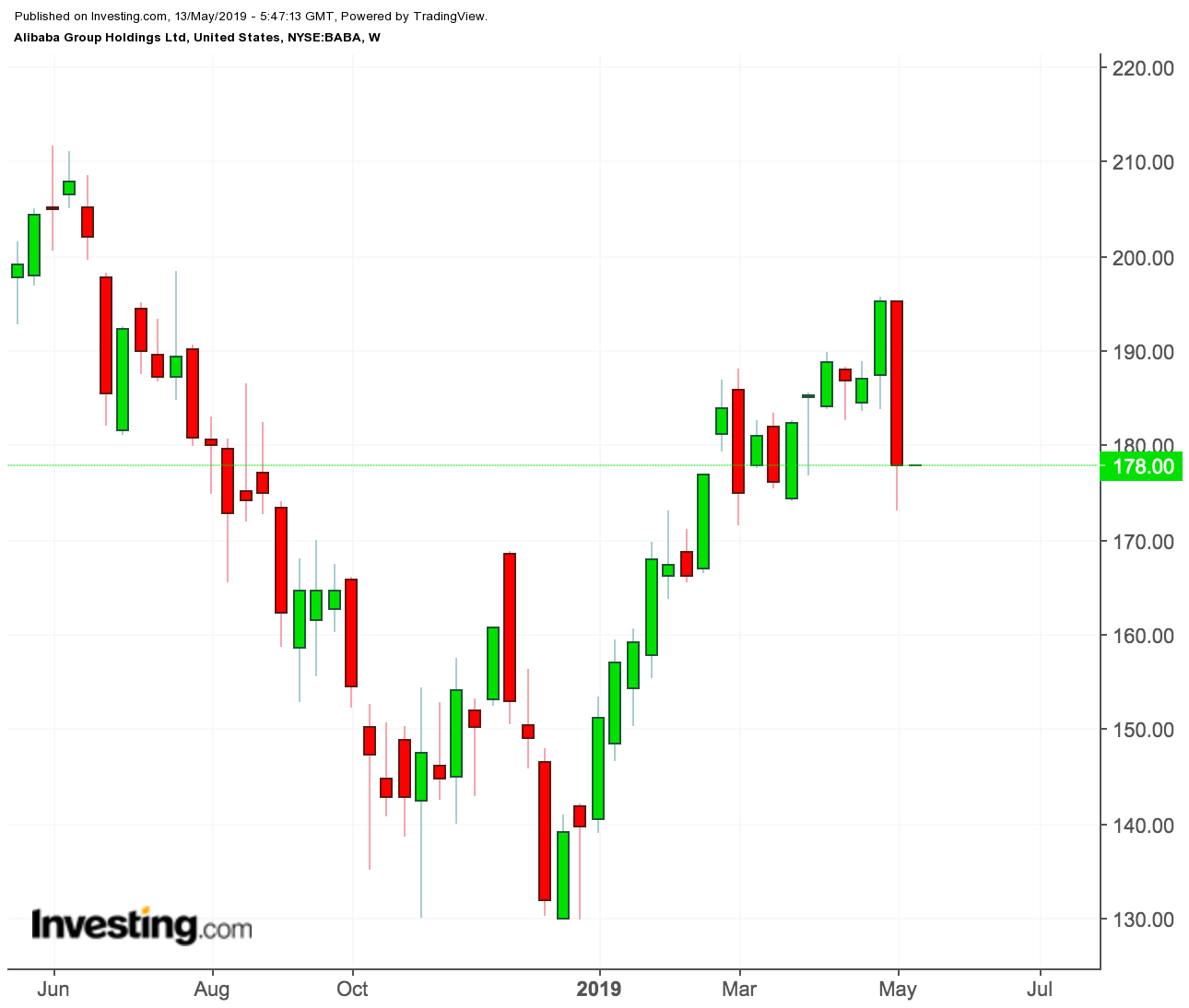* Reports Wednesday, May 15, before the open
* Revenue Expectation: $13.47B, EPS: $0.99
The Chinese e-commerce giant, Alibaba (NYSE:BABA) has a lot at stake when it reports 4Q earnings on Wednesday. Its shares have rallied about 30% since the January lows, on optimism that the Chinese consumer economy remains strong enough to support expansion in the company’s sales.
But that upbeat scenario is increasingly coming under threat amid China’s escalating trade war with the U.S. and growing competition within China from other e-commerce operators. U.S. President Donald Trump on Friday raised tariffs on $200-billion Chinese goods to 25% from 10% and threatened to add more products as trade talks between the two global powers stalled. The stock responded sharply to the news last week, dropping 8.8% over the last five sessions to close Friday at $178.

If the two largest economies in the world fail to resolve their dispute and enter a full-blown trade war, Alibaba’s sales projections for its next fiscal year may weaken, clouding the outlook for its stock. The slowdown in China is most likely to hit sales of consumer durable goods and Alibaba has already seen slower growth in consumer electronics, especially cell-phones, its Vice Chairman Joe Tsai told analysts in January.
Alibaba is also facing strong competition from Chinese online retailers including Jd.Com (NASDAQ:JD) and Pinduoduo (NASDAQ:PDD). Alibaba, with a market capitalization of $461 billion, had reported a 27% revenue jump from its core retail-marketplace business in the quarter through December, compared with the same period in the previous year. That was the slowest expansion in three years as the unit, comprising the Taobao and Tmall e-commerce platforms, came under pressure.
Despite Challenges, Alibaba Is a Safer Bet on China
Despite this challenging environment for consumer companies based out of China, we see Alibaba as a much safer bet than smaller players which have yet to show a sustained path to growth. For that reason, we like Alibaba, the Chinese equivalent of Amazon.com (NASDAQ:AMZN), more than any other tech stocks.
The company continues to post robust growth in its user base and is fast monetizing new ad revenue streams. Revenue from Alibaba’s core commerce platform jumped 40% in the third-quarter when compared with the same period a year ago. Its cloud-computing segment brought in sales that were 84% higher, and its innovation initiatives expanded 73% during this period, signaling success in the company’s efforts to diversify its business.
Going forward, Alibaba has a much better chance to grow and diversify. The company has invested heavily to expand in the cloud-computing business by opening new data centers in Europe, the Middle East, South Asia, Southeast Asia and in the domestic Chinese market.
China’s latest economic measures to boost domestic growth is another reason that makes us more bullish about Alibaba. China plans to boost spending by 2 trillion yuan ($291.4b), or 2% of its $13 trillion economy and give 30% more loans to small businesses. This all bodes well for retail stocks and Alibaba is well positioned to benefit if these measures boost consumer spending.
Bottom Line
The continuing trade-related uncertainties and the risks to China's economic growth means this is probably not the best time to take on exposure to Chinese stocks. And, for the same reasons, we don’t see Alibaba producing an upbeat forecast for its next fiscal year when it reports Wednesday.
However, the majority of analysts on Wall Street have a buy rating on Alibaba, with an average $207.57 price target. So, if your investing horizon is long-term, buying Alibaba stock on a possible dip is a good idea, given the company’s dominant market position and its ability to benefit from Chinese growth acceleration plans.
